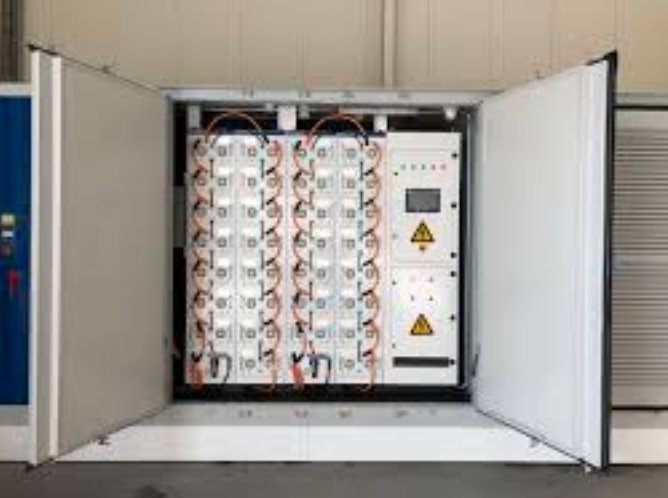Balance Power has secured unanimous planning approval to develop a 29.9-megawatt battery energy storage system (BESS) in East Ayrshire, Scotland, marking a significant step forward in the UK’s energy transition and local energy resilience.
The Coylton-based facility, slated to go online by summer 2026, will be comprised of 18 battery units across a 2.67-hectare site and has been designed to store surplus renewable electricity during periods of peak generation, discharging it when demand is highest.
Approved by East Ayrshire Council following what the company described as “extensive community consultation,” the project underscores growing momentum behind battery storage as the UK scales up its renewable energy infrastructure.
A Boost for Local Grid Stability
The Coylton BESS will have the capacity to power approximately 16,200 homes, contributing significantly to local energy security and easing grid congestion—two of the most pressing challenges facing renewable-heavy regions like Scotland.
“Battery storage plays a vital role in balancing the grid as we continue to reduce reliance on fossil fuels,” said Oli Pettersen, Balance Power’s connections manager. “This site not only supports local and national net zero goals, it also creates jobs and boosts energy reliability for the community.”
Located south of Coylton village, the facility will interface with the national grid, storing low-carbon electricity—such as surplus wind power generated during off-peak periods—and releasing it when the grid is under strain, including evenings and high-consumption hours.

Council Support Highlights Clean Energy Shift
Approval from East Ayrshire Council was unanimous, reflecting both community engagement and the region’s openness to low-carbon development. According to planning documents, the project underwent environmental and noise impact assessments, and the developer agreed to site restoration post-decommissioning.
The decision reflects a broader trend among local authorities in Scotland toward actively supporting energy storage infrastructure as the backbone of decarbonisation efforts.
“We’re delighted with the council’s decision and grateful for the community’s constructive feedback throughout the process,” said a Balance Power spokesperson. “We remain committed to minimising disruption and ensuring the site benefits the local area not just during operation, but through its entire lifecycle.”
Scotland’s Energy Storage Landscape Expands
Scotland is increasingly seen as a critical testing ground for integrating storage and renewable generation, with vast onshore and offshore wind resources. However, grid limitations have long hampered the ability to make full use of those assets.
Battery energy storage systems (BESS) like Coylton’s are seen as a crucial solution, helping avoid curtailment—where wind turbines are shut off due to oversupply or bottlenecks. The UK currently faces billions in annual constraint costs when renewable energy cannot be absorbed by the grid.
| Project | Capacity (MW) | Status | Developer |
|---|---|---|---|
| Coylton BESS | 29.9 | Approved | Balance Power |
| Wishaw BESS | 50 | Under Construction | Gresham House |
| Blackhillock BESS | 300 | Proposed | SSE Renewables |
| Tealing BESS | 200 | Planning | Amp Energy |
Part of a Growing National Footprint
The Coylton project is just one in a broader wave of battery deployments being pursued by Balance Power, a fast-expanding developer based in the UK. Since 2017, the company has secured planning consent for 36 projects totaling 532 MW of capacity and is actively developing more than 2 gigawatts of additional energy infrastructure across England, Wales, and Scotland.
Only last month, Balance Power received approval for a 49.5-MW BESS project in South Staffordshire, England, continuing a rapid expansion push into key energy markets.
The developer typically aims for project sizes just below regulatory thresholds requiring additional Nationally Significant Infrastructure Project (NSIP) scrutiny, often landing in the 20–50 MW range—a sweet spot for speed and scalability.
Jobs and Just Transition Benefits
In Coylton, the battery facility is expected to create local construction jobs and operational roles, contributing to what Scottish ministers have described as a “just transition” for rural communities historically reliant on high-carbon sectors.
The project will use modular battery containers, likely based on lithium-ion technology, and Balance Power has committed to environmental stewardship and biodiversity protections during the build phase.
Following the expected 25–30 year operational life, the company says the site will be fully restored to its original condition and use, avoiding long-term landscape impact.
Scotland Targets Net Zero by 2045
The project supports Scotland’s legally binding target to reach net zero emissions by 2045, five years ahead of the rest of the UK. That path relies heavily on both expanding clean generation and deploying systems that allow more flexible, responsive management of electricity supply and demand.
The UK government has also set ambitious goals for energy storage, with the Department for Energy Security and Net Zero forecasting more than 50 GW of grid-scale battery capacity may be needed by 2050 to stabilise a renewables-led system.
Balance Power’s strategy aligns with these trends, focusing on medium-sized grid support systems that can be deployed quickly without heavy infrastructure expansion.
Industry Outlook
As policy and market mechanisms evolve—including potential reforms to capacity markets and dynamic frequency regulation—developers see a growing financial case for BESS. Analysts also point to enhanced grid connection rights and co-location incentives as levers accelerating the rollout.
Balance Power’s Coylton site may not be massive in scale, but its role in buffering intermittency, enabling local decarbonisation, and pioneering rural energy solutions could offer a model for replication across Scotland’s countryside.


















